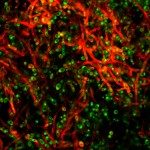Link to Pubmed [PMID] – 19104029
Link to DOI – 10.1128/AAC.01220-08
Antimicrob Agents Chemother 2009 Mar; 53(3): 1048-53
Invasive otitis externa (IOE) due to Aspergillus is a rare, potentially life-threatening, invasive fungal infection affecting immunocompromised patients. The invasive process may lead to skull base osteomyelitis with progressive cranial nerve palsies and can result in irreversible hearing and neurological impairment. We report two cases of Aspergillus IOE treated with voriconazole alone and a literature review of antifungal therapy of Aspergillus IOE. Twenty-five patients, including the two described in the present report, were analyzed. Eighteen patients were treated with amphotericin B, and nine of them received itraconazole as an additional agent. Three patients received initial therapy with itraconazole, and one patient was treated with both voriconazole and caspofungin therapy. The two patients in the present report received voriconazole therapy alone with good clinical and biological tolerance despite prolonged treatment. The last patient did not receive antifungal therapy, as the diagnosis was made postmortem. Eighteen patients underwent an initial extensive surgical debridement. The majority of the patients had a favorable outcome, 17 patients experienced a complete recovery, and 6 showed a partial improvement. Both of the patients reported on here had favorable outcomes, and no aggressive surgical debridement was required. Although voriconazole has been shown to be effective for the treatment of invasive aspergillosis, its precise role in the management of Aspergillus IOE had not been documented. These observations demonstrate that voriconazole could be an effective and well-tolerated therapeutic option for the management of Aspergillus IOE.



